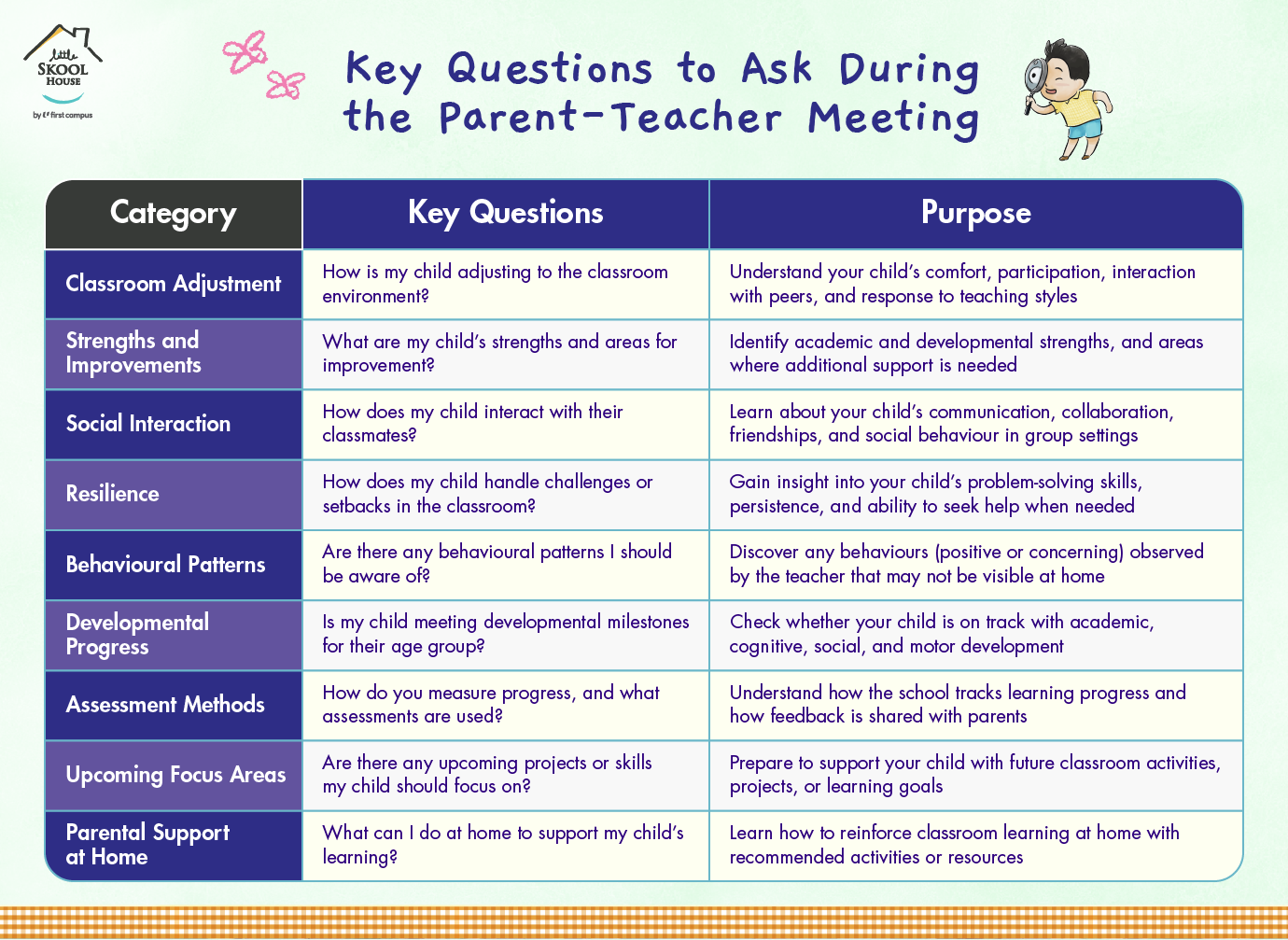BACK
Parent-teacher meetings are a vital part of your child’s educational journey, offering insights into their progress and strengthening the home-school connection. In Singapore, where early education is highly valued, knowing the important questions to ask can make all the difference.
At centres like Little Skool-House, parent-teacher partnerships are key to nurturing confident and capable learners. We give you nine essential questions to guide your conversation and support your child’s development.
Understanding the Importance of Parent-Teacher Meetings
Parent-teacher meetings, also called parent-teacher conferences, are more than just routine check-ins; they are an essential platform for parents and educators to communicate openly about a child’s growth and development. Engaging with your child’s teacher during these meetings provides valuable opportunities to:
- Gain insights into your child’s progress. Teachers can share observations that you may not notice at home, offering a holistic view of your child’s social, emotional, and academic journey.
- Address challenges early. Identifying any academic or behavioural concerns early on helps parents and teachers collaborate on solutions.
- Build a support network. Regular communication between parents and teachers fosters trust, ensuring that both parties are aligned in supporting the child.
By approaching parent-teacher conferences with the right questions and mindset, you can establish a productive partnership that positively impacts your child’s educational experience.
Preparing for the Parent-Teacher Meeting
A successful parent-teacher meeting starts with proper preparation. Being organised and clear about what you want to discuss will ensure you make the most of your time. Here are some steps to help you prepare:
- Review Past Communication. Go through previous progress reports, newsletters, or emails from the teacher to refresh your understanding of your child’s development.
- Take Note of Observations. Jot down any behaviours or learning habits you’ve observed at home. This can include anything from social interactions to learning challenges or strengths.
- Prepare Specific Questions. Use the nine questions in this guide as a framework, but don’t hesitate to add your own.
- Bring the Essentials. Have a notebook or digital device ready for taking notes. This allows you to easily reference important points after the meeting.
At Little Skool-House, our parent-teacher meetings are designed to be transparent and collaborative. Coming prepared not only shows your commitment but also sets the stage for meaningful dialogue that supports your child’s growth.
Key Questions to Ask During the Parent-Teacher Meeting

Parent-teacher meetings are your opportunity to understand how your child is thriving in the classroom, not just academically, but also socially and emotionally.
1. How is my child adjusting to the classroom environment?
Understanding how your child adapts to the class setting can reveal a lot about their comfort and sense of belonging. This question helps you learn about their behaviour, participation, response to the teacher’s teaching style, and interaction with classmates.
2. What are my child’s strengths and areas for improvement?
Identifying your child’s strongest subjects allows you to celebrate their achievements, while recognising areas for improvement helps you support their growth effectively. Teachers can provide insights into academic skills, social interactions, and emotional development.
3. How does my child interact with their classmates?
Your child’s social skills are a critical part of their early development. Asking this question helps you understand how your child communicates, collaborates, and navigates relationships with other students and friends. Teachers may highlight friendships, group activities, and any challenges in social settings.
4. How does my child handle challenges or setbacks in the classroom?
Understanding how your child responds to challenges provides insight into their resilience and problem-solving abilities. Does your child ask for help when needed? Are they persistent when facing difficulties? These observations can help you nurture a growth mindset at home.
5. Are there any behavioural patterns I should be aware of?
Teachers often observe behaviours that parents might not notice, especially in group settings. Whether it’s signs of distraction, hesitation to participate, or notable enthusiasm during activities, being aware of these patterns allows you to address them early on.
Academic Development and Progress
A strong academic foundation is built on consistent growth and understanding of core concepts. During the parent-teacher meeting, it’s important to ask targeted questions that provide insight into your child’s performance.
6. Is my child meeting developmental milestones for their age group?
Understanding if your child’s growth is on track with key developmental milestones helps you gauge their progress. This includes not only academic skills like reading and counting but also cognitive and motor skills.
7. How do you measure progress, and what assessments are used?
Different schools use various methods to evaluate a child’s progress, from observational assessments to structured evaluations. Asking this question helps you understand how your child’s learning is tracked and how feedback is communicated by requesting specific examples of your child’s strengths and weaknesses.
8. Are there any upcoming projects or skills my child should focus on?
Understanding what’s coming up in the school year allows you to prepare your child for new learning opportunities. Whether it’s a group project, a storytelling session, or early math concepts, knowing in advance helps you reinforce these skills at home.
Building a Strong Parent-Teacher Partnership
The relationship between parents and teachers is fundamental to a child’s development. A strong partnership ensures that your child receives consistent support both at school and at home.
9. What can I do at home to support my child’s learning?
Children thrive when there is alignment between what they learn in school and how it’s reinforced at home. This question allows teachers to recommend specific activities, reading materials, or habits that you can introduce at home to bolster their understanding and encourage them to build on their strengths and improve on their weaknesses.
For instance, if your child is working on phonics or basic numeracy, practising these concepts at home can significantly enhance their learning experience.
Potential follow-up actions after the meeting
A productive parent-teacher conference doesn’t end when you walk out the door. It’s essential to take actionable steps that ensure the discussion leads to real change and continued support for your child. Here’s how you can follow up:
Set Clear Goals
After discussing your child’s progress, work with the teacher to set clear, achievable goals by understanding what is expected from both parents and students. These could be academic, social, or emotional milestones.
For example, if your child is struggling with social interactions, a goal might be to engage in more group activities or build specific social skills.
Maintain Regular Communication
Keep the lines of communication open with the teacher. If something arises between meetings, don’t hesitate to reach out and talk. Whether it’s a quick email or a brief conversation, staying in touch ensures any challenges are addressed promptly.
Support Homework and Learning at Home
Use the suggestions and advice shared during the meeting to reinforce learning at home by understanding the effort required for assignments. Set up a designated study area, help with homework when needed, or create learning opportunities through everyday activities.
Monitor Progress
Keep track of your child’s progress by reviewing any follow-up materials or reports the teacher provides. Continue to check in regularly with your child to see how they’re progressing in areas discussed.
How Parent-Teacher Collaboration Unlocks Your Child’s Full Potential
Parent-teacher meetings are an invaluable opportunity for parents to gain insight into their child’s learning journey and strengthen the support system around them.
By asking the right questions and fostering a positive environment for collaboration with educators, you can ensure that your child thrives academically, socially, and emotionally.
At Little Skool-House, we believe that a strong partnership between parents and teachers is key to nurturing confident, curious, and capable children. By staying engaged and proactive, you help create an environment where your child can grow and succeed.
Remember, the journey to your child’s success doesn’t stop at the meeting—it continues through consistent communication, support, and encouragement at both home and school.
Choose from 20 Conveniently-Located Centres
Find A Little-Skool House Near You
Discover the Little Skool-House Difference
Register Now for a Journey of Learning and Growth.
- Award-winning teachers
- Proven bilingual curriculum
- Trusted by parents across Singapore
Find a preschool near you and give your child the best start in their early learning journey. Limited slots available. Secure your child’s place today.



